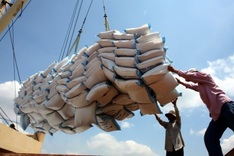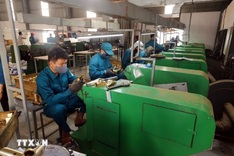With a population of over 240 million Muslims, ASEAN has become a fertile ground for Vietnamese businesses looking to tap into the potential of halal product exports, particularly farm produce and processed foods.
The region is seen as a gateway for made-in-Vietnam products to better integrate into the international halal supply chain.
Currently, Indonesia, Malaysia, the Philippines, and Singapore represent the largest importers of halal agricultural products and foods in ASEAN, with key commodities including rice, vegetables, fruits, cashews, coffee, cocoa, and seafood.
Opportunities from consumers’ needs
Within the halal ecosystem, agricultural products and processed foods form the foundation, accounting for a significant proportion of the global halal market value. The ASEAN region's growing demand, combined with geographic proximity that reduces transportation costs, creates a substantial competitive edge for Vietnamese enterprises.
Vietnamese Trade Counsellor in Indonesia Pham The Cuong said Indonesia, with 87% of its population being Muslims, is the largest halal consumer in ASEAN. Indonesia's market is projected to reach 282 billion USD by 2025, or 11.34% of global halal consumer spending.
Vietnamese goods have already made headway in Indonesia, with rising export turnover over the recent past, creating a significant advantage for businesses seeking deeper inroads into the halal product segment. Direct flight connections between Vietnam and Indonesia also facilitate smoother trade of perishable agricultural goods, helping preserve product quality.
In Malaysia, the Vietnamese Trade Office said Vietnamese exports like rice, fruits and vegetables, and coffee experienced impressive growth in 2024. While halal certification is not mandatory for imports, many Malaysian importers favour certified goods to cater to local consumer expectations. Over the past years, the country has been very active in developing its halal industry, with the renowned JAKIM certification system.
Meanwhile, Singapore represents a niche but high-potential market for halal agricultural products, driven by quality consumption demands and its position as a regional transshipment hub. The demand for halal food not only comes from Muslims but extends to the consumer group interested in quality, food safety, and ethical consumption. Singapore also serves as a gateway for Vietnamese halal products to enter regional and global Halal distribution systems.
In the Philippines, the third-largest Muslim population in Southeast Asia, Vietnamese Trade Counsellor Phung Van Thanh said the archipelago nation imported over 100 million USD worth of halal standard products annually during 2020–2024 from such major suppliers as the US, New Zealand, and India. Notably, only 2% of the imports came from ASEAN member states, signaling a significant untapped opportunity for Vietnamese firms.
Expanding halal presence in retail systems
Vietnam's Trade Office in Indonesia suggested exporters partner with local distributors to access both traditional stores and supermarkets like Hypermart, Carrefour Transmart, Giant, Lotte Mart, Superindo, Food Mart, Hero, and Food Hall to enter deeper into this market. Better engagement in e-commerce is also key as Indonesia is among the ASEAN leaders in online retail, with major platforms including Shopee, Tokopedia, Lazada, and TikTok Shop.
In the Malaysian market, Trade Counsellor Le Phu Cuong advised Vietnamese enterprises to set up trade connections with halal-certified food importers and large retail chains such as NSK Trade City, Mydin, and Ecoshop. Besides, regular participation in annual trade fairs presents prime opportunities for business matchmaking and market exposure.
Sharing this perspective, Vietnamese Trade Counsellor in Singapore Cao Xuan Thang laid stress on the importance of participating in trade fairs to boost halal trade with partners in ASEAN.




















